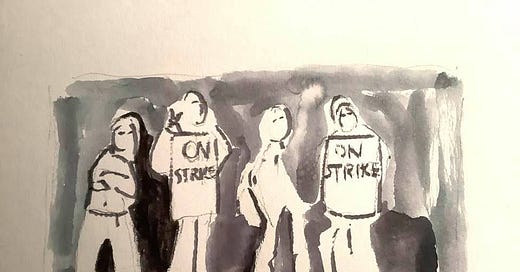John Deere sticks to last offer. Strikers sticking to the picket line.
Subscriptions to the newsletter are free. Contributions are welcome. $5 a month or $60 a year. Free subscribers can upgrade to paid at any time.
The Iowa Farmers Union, an organization representing family farmers across the state issued a statement in support of the nearly month long strike by 10,000 UAW workers at John Deere.
“While the Iowa Farmers Union acknowledges the important role of John Deere here in Iowa, we believe it is critical to stand in support of the men and women of the United Auto Workers (UAW) in their contract actions.
The Iowa Farmers Union is built on the principles of cooperation, fairness and working to find common ground. However, concentration in machinery manufacturing and the increasing disparity in compensation between workers and managers makes the current negotiations critical for the fair treatment of current and future workers. As Iowa farmers, we know a healthy agriculture system requires all parts of that system to be fairly and equitably compensated.
The UAW action sets an important example of the power of workers standing together for a common goal. Many of us who are proud to use Deere products on our farms, businesses, homes, and recreation spaces understand the role workers play in ensuring product quality. In turn, we stand in solidarity with the UAW.”
Last week, 55% of striking John Deere workers rejected what management called their last, best and final offer.
But in the middle of harvest season, what exactly are management’s options?
I’m no expert on owning a multi-national heavy equipment production company, but I don’t think it takes being one to speculate that the options for John Deere are limited.
They can hire scab labor and shift office folks over to production. They have already done some of that with limited success.
Plus, in the current labor market it doesn’t seem likely that Deere can hire enough scabs to replace 10,000 strikers.
Workers looking for jobs have plenty of choices without having to cross a picket line.
Deere has already announced they are going to try moving more of their production overseas.
I had to laugh when I read the company announcement. Have they seen the pictures of piled high shipping containers at the nations ports and the collapse of the supply chain?
Deere has overseas production facilities but they will face a hell of a time getting anything delivered before this year’s harvest season is done.
It is not uncommon for management to attempt to go around the union and appeal directly with the rank-and-file. They hope that after a month without a paycheck, solidarity may be weakening.
And 55% is not a huge margin. Some locals voted by a similar margin to accept the last offer.
But it is just a likely that Deere will reconsider their last, best and final offer and dig down into their massive profits and come back with a better offer.
Broken tractors and combines waiting for parts are sitting still in the fields.
The Wall Street Journal reports:
Farmers often sink profits into new equipment annually because they can deduct those purchases from their federal income taxes as business investments. A lack of equipment kept some farmers from buying this year, said Robert Klemm, who grows corn and soybeans in Illinois and runs an agricultural tax-planning and preparation firm.
“It’s a chain reaction,” said Mr. Klemm. He said having parts available from factories and dealerships is also vital during the fall harvest, when agricultural machinery often breaks down and farmers don’t have 30 to 60 days to wait for supplies to be replenished.
Farmers placing orders through Deere’s early ordering program that started in August typically get their equipment in January or February. Blue Riggan, owner of Legacy Equipment LLC, in Arkansas, expects that delivery times will be extended the longer the strike lasts.
“If they go out for a long time, it would probably push us out until March or April,” said Mr. Riggan, referring to striking workers.
Deere dealers say the strike hasn’t caused their customers to defect to rival brands because competitors remain constrained by their own supply and production problems. CNH Industrial NV, the maker of CaseIH equipment, pared its 2021 sales guidance on Thursday because of ongoing supply-chain problems.




